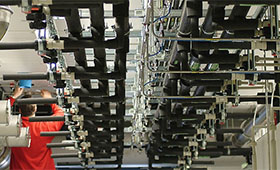Major developments in training in the sanitary, heating and air conditioning sector
Training in the occupation of plant mechanic for sanitary, heating and air conditioning systems is modernised
31/2016 | Bonn, 05.07.2016

Digitalisation is now also very much making its mark in the field of sanitary, heating and air conditioning engineering. Networked technology such as smart home systems and the topic of sustainability are gaining in significance. The sustainable use of energy and resources, new systems for the management of buildings, the installation of such systems and relevant customer advisory services are all in greater demand. For this reason, and acting on behalf of the Federal Government, the Federal Institute for Vocational Education and Training (BIBB) has joined forces with the social partners and with experts from the field of company practice to update the three-and-a-half year training in both the craft trades and industrial sectors in the occupation of plant mechanic for sanitary, heating and air conditioning systems. The new training regulations enter into force on 1 August.
The topic of building management systems has been included in the general training plan for the first time. Trainee plant mechanics for sanitary, heating and air conditioning systems acquire in particular a comprehensive knowledge of control, management and data exchange systems. They also learn about opportunities for the remote monitoring of buildings and how to advise customers and install the relevant systems in this regard. This also includes using device-specific software such as apps. The focus is on taking account of correlations that exist across different trades and of building energy standards, a building being viewed as an overall energy system.
Greater significance in future will be attached to the implementation of hygiene measures in respect of drinking water, service water and ventilation systems. Advising customers on hygiene risks also forms part of the modernised training. Stricter regulations, modern technologies and more demanding systems are the reason why a separate relevant “occupational field position”, i.e. stipulation of characteristic training and vocational content, has been arrived at for the first time.
The updated training regulations encompass the areas of deployment of sanitary, heating, ventilation and air conditioning technology as well as covering renewable energies and environmental technology. Alongside these areas, essential contents include installation and disassembly, commissioning and maintenance of technical supply and disposal plants, systems and their components and of pipe conduits and ducts, the application of plant and system engineering and the installation and testing of electrical sub-assemblies and components included in such plants and systems. Customer orientation also plays a major role in all these tasks and in handover to the customer complete with instructions on how to operate the plants and systems.
Because the updating of the occupation means that it is now aligned to the occupational group of metal working, school-based training in the first year will in future take place together with the metal working occupations governed by the industrial and craft trade sectors. Training as a skilled electrical worker for certain stipulated activitiesis integrated into the vocational education and training. Plant mechanics may use such an additional title following training as long as they are designated as such by the company.
The extended final or journeyman’s examination, depending on whether the examination is completed in the industrial or craft trades sector, is a further new feature. The first part of the examination, which accounts for 30% of the final mark and relates to the area of supply technology, takes place before the end of the second year of training. Part 2 of the examination is held at the end of the training and covers the areas of the customer order, work planning, system analysis and repair and business and social studies.
In 2015, there were over 11,000 newly concluded training contracts in the occupation of plant mechanic for sanitary, heating and air conditioning systems, making it the 11th most popular dual training oc-cupation. The occupation is clearly male dominated. Only 1.3% of new trainees are women.
Although plant mechanics for sanitary, heating and air conditioning systems are also trained in industry, training primarily takes place in the craft trades sector. The chances of being offered permanent em-ployment on completion of training are very good. Following training, there is the opportunity to pursue qualified advanced training leading to the qualifications of master craftsman installer and heating fitter or certified energy networks foreman. Relevant courses of higher education study in subjects such as supply technology, facility management or engineering are also a possibility. An additional potential pathway is advanced training as a state-certified technician in a relevant specialism (heating, ventilation, air conditioning, sanitary or machine technology).
The modernised training regulations and the coordinated skeleton curriculum for the school-based part of the dual vocational education and training replace existing regulations which date back to 2003.
Picture material is available at www.bibb.de/pressefotos.
Contact at BIBB:
Axel Kaufmann
Reprint free of charge – voucher copy requested.